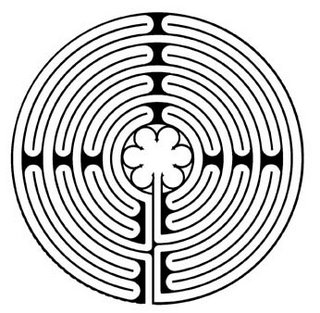I met some amazing people, experienced some new things spiritually, and enjoyed wonderful warm conversation. I'll be writing in more detail about specifics of the conference in my HerWork blog and on SpOTJ (pronounced spot-jay), so this entry is more about what the time meant to me as an individual.
There were many, many different traditions represented at the conference, so I thought I would investigate one I'd been curious about—the labyrinth. (I'd wanted to try yoga too, for the first time, but the session was cancelled at the last minute.)
The labyrinth at the conference was a large canvas circle with this pattern on it:

You're invited to start in a small circle drawn outside the entrance point, then step out of the circle, leaving your "self" in the circle, moving that self away, then step back into the circle without that day-to-day self. Breathe, etc., then start your journey. There was calming steady music and dim lighting to set the mood.
I can't claim to be able, or even to want to, empty my thought as it seems most who do this recommend. I was thinking throughout, very distinctly. My thoughts centered on the now-ness of the experience, that right in those moments when I was walking, I was neither more nor less than I had ever been, that I had all creation with me right then, that I was complete and in total harmony with Spirit. Basically, to me, it was an opportunity to pray while walking.
In the center of the labyrinth is a space to sit and contemplate further. I found myself taken with the music that was playing and I allowed it to flow around me, concentrating on its slowness. I enjoyed the feeling I often get in prayer, that of floating and of light.
In my journey back out of the labyrinth, I got the idea of carrying this light back out with me, in particular to my children. They rose spontaneously to thought as they often do when I'm in the heart of prayer, so I embraced the idea of sharing the uplift I was feeling with them.
So what did I take from this experience? I'm grateful to know that my prayer discipline already gets me there in many ways. This was a different setting but the results were the same. I've always had a strong respect for the discipline of meditation as I've read about it—I can see many parallels with prayer, although perhaps they're not equivalent. I do believe that prayer is most effective when you quiet the senses and turn thought away from the day-to-day.
Prayer involves inviting an experience of the transcendent to thought. Meditation to me involves a physical discipline of quieting the body, and I've adopted some of that discipline in my own desire to pray more deeply. But my experience has been a bit different than what the meditation writers I've read describe. For example, instead of calming my breathing first and then experiencing an uplifted state, I've noticed that when I mentally achieve the uplifted state, my breathing regulates itself. The physical is a result of the mental state, not a cause.
Still, this experience was instructive. The gentleman shepherding people through the labyrinth was a delight to get to know, and the atmosphere was filled with peace. And now, as I write about it, I'm feeling that peace again. That to me is the point of spiritual experiences—we learn something, and we take it with us wherever we go.
Your ideas and inspiration are welcome! Please comment below or Contact Laura.
Email this posting to a friend with the envelope icon below.